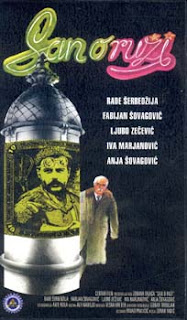
Five comical stories set in Romania during the regime of Nicolae Ceaușescu: an important official is about to pass through a village, so the party inspector tries to "beautify" everything using the help of the locals. However, once they start the carousel, they realize that the engineer is also on board and nobody is on the ground to turn it off. They thus rotate the whole night and miss the visit... The official photographer modifies an image by putting a hat on Ceaușescu, yet the press has to be stopped when everyone realizes that they forgot to delete the hat in his hand... A chicken driver gets arrested for taking eggs from the chickens in his truck... A fat police officer kills a pig before Christmas by gassing it in his kitchen. Yet when he uses a flame to cook it, the gas in the pig explodes... A poor student, Diana, decides to earn some money by teaming up with a con-artist, pretending to work the Ministry of Chemistry and taking samples of air from apartments, but in reality collecting bottles.
An anthology of five directors directing five comical stories set in Romania during the 80s, "Tales from the Golden Age" are a surprisingly catchy and engaging satire, with a sharp jab aimed not necessarily at socialism or communism, or the regime of Nicolae Ceaușescu, but in dictatorship in general, that left the whole society in chaos. Predictably, the anthology is uneven since every director had his or her own take on the story, written by Cristian Mungiu who already took a serious approach at the same subject with his previous film "4 Months, 3 Weeks and 2 Days", yet as a whole it is coherent - the first two stories are arguably the best. The first story should be commended for engaging the viewers instantly through its humorous take on a official visit to a village where the party inspector demands for pigeons to be released during the passing of the car - a man asks: "He had pigeons, right?" and gets this answer: "Yeah, but he ate them." In the same scene, someone asks for the carousel to be turned on, but gets the reply that they still did not get fuel for it. In that one scene, thus, the director already showed how the people are forced to glorify a leader that not only leaves them hungry, but also scarce on other resources as well. The second story is also sharply witty, but the third story already shows that a sudden switch from comical to serious was not that even, whereas the forth segment, in which a fat man tries to kill a pig in his apartment, could be seen as an allegory promoting vegetarianism, yet in a heavy handed way. The fifth story again returns to the purely "A je to!" nonchalant tone, yet the movie is slightly overlong by that time.
Grade:++
















